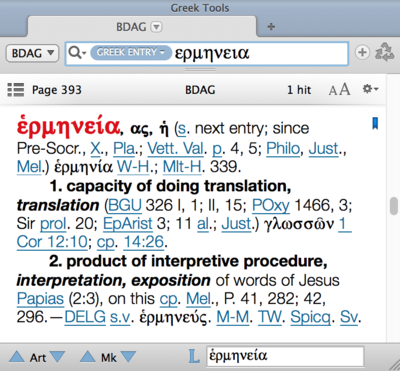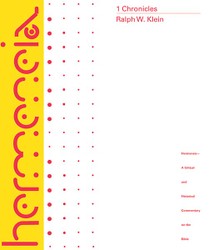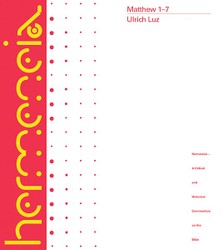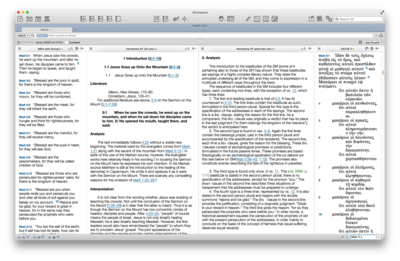
WHAT KIND OF COMMENTARY SERIES IS HERMENEIA?
Again, from the publisher:
“The series is designed to be a critical and historical commentary to the Bible without arbitrary limits in size or scope. It will utilize the full range of philological and historical tools, including textual criticism (often slighted in modern commentaries), the methods of the history of tradition (including genre and prosodic analysis), and the history of religion.”
The above description is quite telling. When the claim is made that Hermeneia is designed to be “without arbitrary limits in size or scope,” that’s no exaggeration. There are countless commentaries on the Bible, but how many commentary series attempt to engage the wider body of literature related to the Bible as well? The editors and writers of Hermeneia do not confine themselves to any particular canon as the 49 volumes (so far) provide exegesis over traditional biblical literature—including the Deuterocanonicals—as well as Pseudepigrapha and the writings of the early church.
Hermeneia is described as being “designed for the serious student of the Bible,” and that’s not an understatement. Hermeneia is simply one of the most detailed modern commentary series available today, but that does not mean that it is too technical for most readers. Moreover, it is extremely thorough in its treatment of texts and issues regarding texts without becoming bogged down in in minutia.
The Hermeneia series is a critical and historical Bible commentary utilizing a full range of the most current textual, philological and historical tools. It excels in providing scholars and serious students with synchronic and diachronic textual analysis complemented by a depth of commentary and historical interpretation that sets the mark for today’s most advanced exegetical and historical-critical commentaries.
HERMENEIA ON ACCORDANCE
Accordance users who have purchased the Hermeneia series will immediately notice that the set is divided into eight distinct modules. Some of the divisions make logical sense, such as having separate modules for Old and New Testaments, for the Apostolic Fathers, and for the Pseudepigrapha. Inevitably, though, one will wonder why there are two separate New Testament volumes and two separate Old Testament volumes. A bit of explanation is necessary.
When the editors have stated that their commentary series should not have “arbitrary limits,” this applies to the volumes included. Most commentary series will have one volume devoted to a book of the Bible by one writer. Since commentary series often take decades to produce, often one volume will be entirely replaced by a newer volume that takes advantage of new archaeological discoveries or literary and textual insights. This is true with Hermeneia as well, but just because a newer volume has been produced does not mean that the original one is no longer worth reading. Moreover, the editors decided that certain sections of texts, such as The Sermon on the Mount and Q (the content in the Gospels common to Matthew and Luke) should receive focused treatment in addition to the coverage provided in the standard commentary volumes.
One of the most useful benefits of having texts and commentaries in Accordance can be found in the ability to have them side-by-side. This feature is applied to Hermeneia by allowing the Accordance user to place, for instance, Ulrich Luz’s volume on Matthew’s Gospel side by side with Hans Dieter Betz’s even more detailed volume on the Sermon on the Mount. Or perhaps the Accordance user will want to compare Richard Pervo’s treatment of Acts with the older, but still highly insightful and beneficial volume on Acts by Hans Conzelmann.
NEW HERMENEIA VOLUME ON LUKE 9:51-19:27
With the addition of François Bovon’s middle volume on Luke’s Gospel, the Hermeneia series for Accordance now stands at 49 volumes. This newly published second volume of François Bovon’s three-volume commentary on the Gospel of Luke, covers the narration of Jesus’ travel on the road to Jerusalem—the occasion in Luke of most of Jesus’ teachings to the disciples regarding faithfulness, perseverance, and the practice of justice and mercy. Bovon’s theological interest in Luke is at the forefront here as he declares in the preface, “I wish to examine his Gospel with the sober reserve of a scholar and with the confidence of a believer. For I hope in this manner to arrive at genuine understanding.” Also distinctive is Bovon’s attention to the history of interpretation of this Gospel through time.
49 VOLUMES TOTAL
Here is a breakdown of what is included in each module.

- 1 Chronicles by Ralph W. Klein
- 2 Chronicles by Ralph W. Klein
- Psalms 2: A Commentary on Psalms 51-100 by Frank Lothar Hossfeld and Erich Zenger
- Psalms 3: A Commentary on Psalms 101-150 by Frank Lothar Hossfeld and Erich Zenger
- Qoheleth by Thomas Kruger
- The Song of Songs by Roland E. Murphy
- Deutero-Isaiah: A Commentary by Klaus Baltzer
- Jeremiah 1: A Commentary on the Book of the Prophet Jeremiah, Chapters 1-25 by William L. Holladay
- Jeremiah 2: A Commentary on the Book of the Prophet Jeremiah, Chapters 26–52 by William L. Holladay
- Ezekiel 1: A Commentary on the Book of the Prophet Ezekiel, Chapters 1–24 by Walther Zimmerli
- Ezekiel 2: A Commentary on the Book of the Prophet Ezekiel, Chapters 25–48 by Walther Zimmerli
- Daniel: A Commentary on the Book of Daniel by John J. Collins
- Hosea by Hans Walter Wolff
- Joel and Amos: A Commentary on the Books of the Prophets Joel and Amos by Hans Walter Wolff
- Micah by Delbert R. Hillers
- Zephaniah by Marvin A. Sweeney
- Fourth Ezra by Michael Edward Stone
- 2 Maccabees by Robert Doran
Hermeneia Old Testament (alternative volume) (Hermeneia OT2)
- Amos by Shalom M. Paul
Hermeneia Pseudepigrapha (Hermeneia2 PS)
- 1 Enoch 1: A Commentary on the Book of 1 Enoch, Chapters 1–36; 81–108 by George W. E. Nickelsburg
- 1 Enoch 2: A Commentary on the Book of 1 Enoch, Chapters 37-82 by George W. E. Nickelsburg
- Fourth Ezra by Michael Edward Stone

- Matthew 1–7: A Commentary on the Gospel of Matthew by Ulrich Luz
- Matthew 8–20: A Commentary on the Gospel of Matthew by Ulrich Luz
- Matthew 21–28 by Ulrich Luz
- Mark: A Commentary by Adela Yarbo Collins
- Luke 1: A Commentary on the Gospel of Luke 1:1–9:50 by François Bovon
- Luke 2: A Commentary on the Gospel of Luke 9:51–19:27 by François Bovon [NEW VOLUME]
- Luke 3: A Commentary on the Gospel of Luke 19:28–24:53 by François Bovon
- John 1: A Commentary on the Gospel of John, Chapter 1–6 by Ernst Haenchen
- John 2: A Commentary on the Gospel of John, Chapters 7–21 by Ernst Haenchen
- Acts: A Commentary by Richard I. Pervo
- Romans: A Commentary by Robert Jewett
- 1 Corinthians by Hans Conzelmann
- 2 Corinthians 8 and 9: A Commentary on Two Administrative Letters of the Apostle Paul by Hans Dieter Betz
- Galatians: A Commentary on Paul’s Letter to the Churches in Galatia by Hans Dieter Betz
- Colossians and Philemon by Edward Lohse
- The Pastoral Epistles by Hans Conzelmann and Martin Dibelius
- Hebrews by Harold Attridge
- James by Martin Dibelius
- Peter 1: A Commentary on First Peter by Paul J. Achtemeie
- The Johannine Letters by Georg Strecker
Hermeneia New Testament (alternative volumes) (Hermeneia NT2)
- The Sermon on the Mount by Hans Dieter Betz
- Acts of the Apostles: A Commentary on the Acts of the Apostles by Hans Conzelmann
- The Johannine Epistles: A Commentary on the Johannine Epistles by Rudolf Bultmann
Hermeneia—Q (Hermeneia Q)
- The Critical Edition of Q by Paul Hoffmann, John S. Kloppenborg, and James M. Robinson
Hermeneia Apostolic Fathers (Hermeneia AF)
- The Didache: A Commentary by Kurt Niederwimmer
- Ignatius of Antioch: A Commentary on the Letters of Ignatius of Antioch by William R. Schoedel
- The Shepherd of Hermas by Carolyn Osiek
Hermeneia Apostolic Tradition (Hermeneia AT)
- The Apostolic Tradition: A Commentary by Paul F. Bradshaw, Maxwell E. Johnson, and L. Edward Phillips
MORE INFORMATION ON HERMENEIA:
For previous coverage of the Hermeneia series, see the following:
Hermeneia 49-Volume Set
Regular price $829
UPGRADES
Users who previously purchased an earlier version of the Hermeneia series have options for upgrading to the current 49-volume OT/NT series or the new 28-volume NT series.
|
To upgrade from… to… |
To upgrade from… to… |
To upgrade from… to… |


